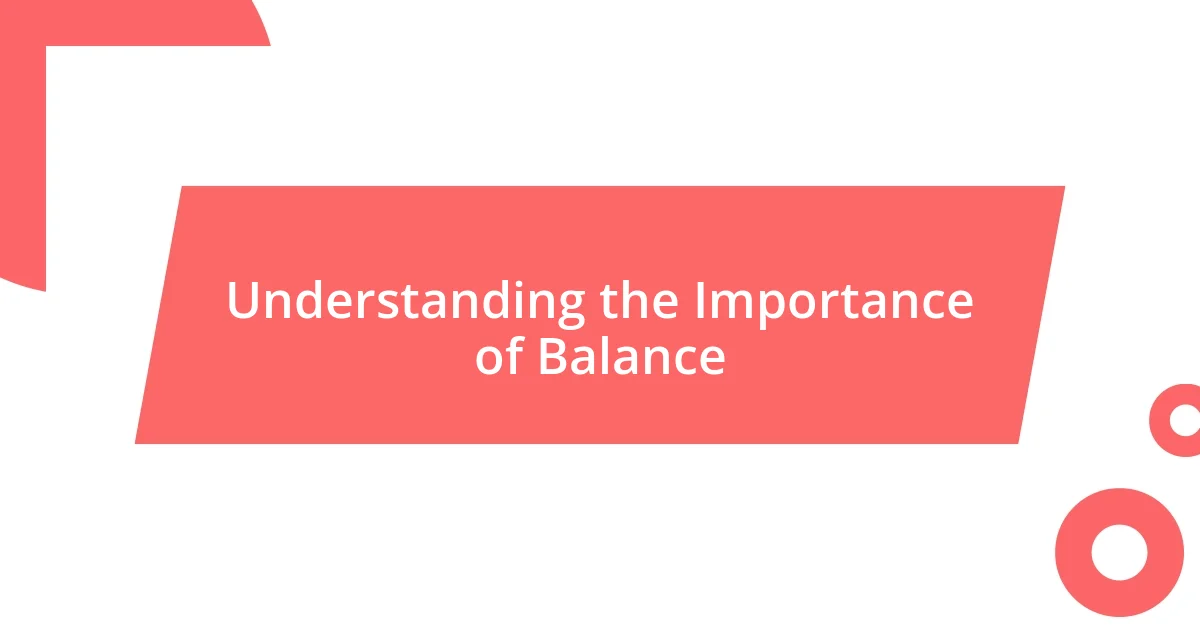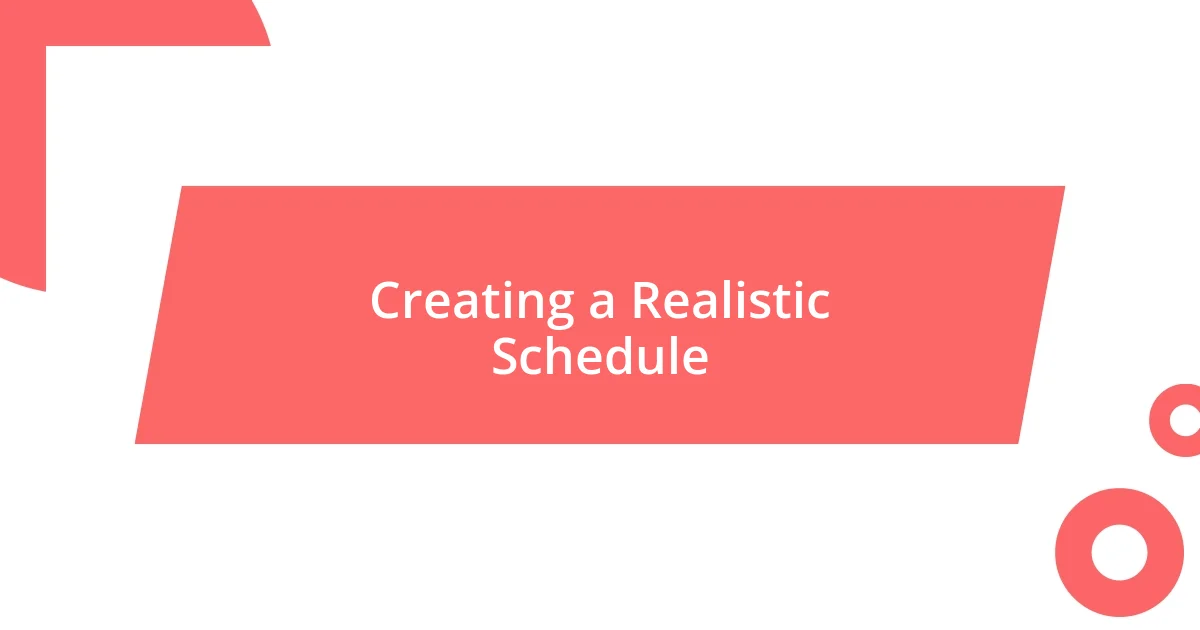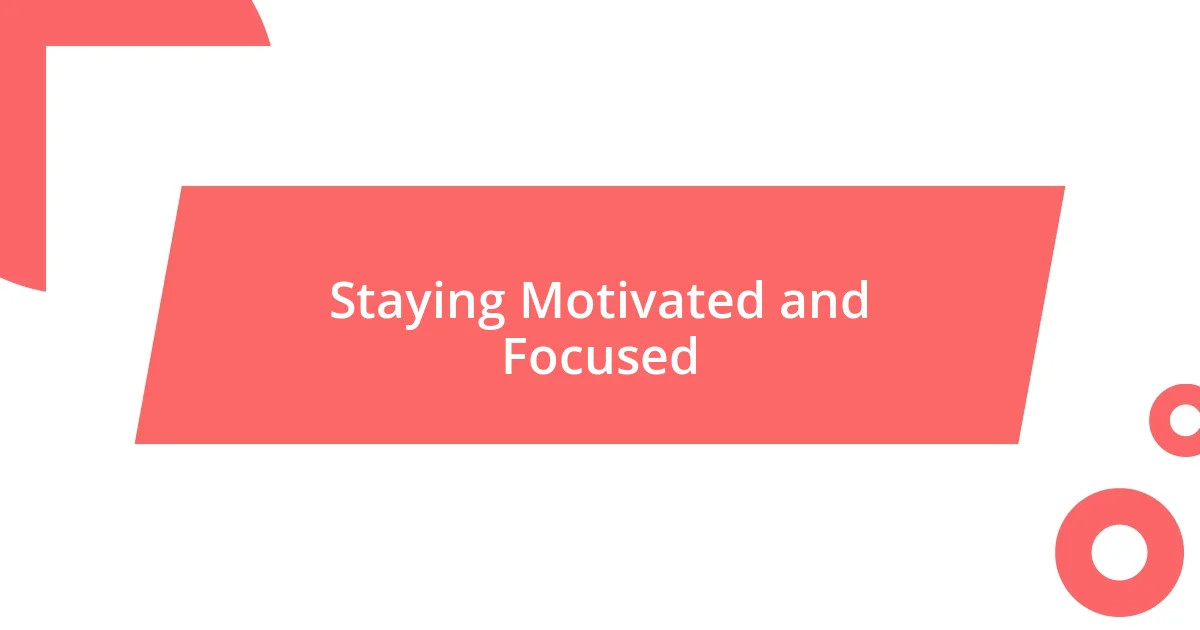Key takeaways:
- Embracing balance enhances well-being and performance in academics and sports, emphasizing the need for rest, social connections, and personal reflection.
- Identifying priorities is essential for managing a packed schedule; individuals should assess their goals, emotional well-being, and flexibility in commitments.
- Regular self-evaluation and seeking feedback can lead to insightful adjustments, helping maintain motivation and a balanced lifestyle.

Understanding the Importance of Balance
Finding balance isn’t just about managing time; it’s about nurturing your well-being. I remember a season when I had back-to-back practices and classes. It felt like I was constantly in motion, yet I found myself emotionally drained. Have you ever felt that way? That exhaustion prompts some serious questioning; is pushing yourself too hard really helping you thrive?
When I began to embrace balance, everything changed. Suddenly, I had more energy and clarity. One afternoon, I decided to step away from my usual routine and spend time with friends instead of hitting the field. That moment of connection rejuvenated my spirit, and I realized that investing in relationships plays a crucial role in my overall performance—both academically and athletically.
Balance is an ongoing journey, not a final destination. It’s easy to get swept up in the demands of school and sports, but acknowledging the importance of rest, hobbies, and social time can transform your experience. I often ask myself: What do I truly value? Those moments of reflection help me create a routine that feels fulfilling and aligned with my goals, allowing me to excel without burnout.

Identifying Your Priorities
Identifying your priorities is the first step towards achieving that balance. I distinctly remember a time when I was caught between intense exam preparations and my commitment to soccer practice. It felt overwhelming at first, but I had to sit down and evaluate what was truly important for my well-being and goals. The process taught me that, while both academics and sports mattered, making a choice based on deadlines or upcoming matches often led to an emotionally charged decision.
To help you identify your priorities effectively, consider the following points:
- Reflect on Your Goals: What do you want to achieve academically and athletically? Write these down.
- Time Commitment: Evaluate how much time each activity requires. Are there gaps where you can focus more on your studies or practice?
- Emotional Well-being: How do you feel about your current schedule? Are there activities that drain you?
- Support System: Think about those around you. Who can you lean on for support in both school and sports?
- Flexibility: Are you open to adjusting your priorities as new challenges arise? Life can be unpredictable!
This clarity will not only ease anxiety but also provide you with a roadmap to navigate your packed schedule.

Creating a Realistic Schedule
Creating a realistic schedule requires an understanding of your time and energy levels. I learned this lesson the hard way during my junior year. I was juggling a demanding study schedule with late-night basketball practices, and honestly, I was a zombie by the end of the week. I took a step back and realized that I needed to create a schedule that accurately reflected my peak productivity hours, leading me to allocate study sessions during my most alert times while reserving practice slots when I felt energized. This simple switch made a world of difference.
To build a manageable timetable, I recommend breaking your day into blocks. I typically designate specific hours for classes, sports, studying, and personal time. By looking at my week as a whole, I can see where I might have bandwidth to shift things around. A key aspect of this is being realistic about your commitments. For instance, if you know that a match is on Friday evening, it wouldn’t be wise to plan an important project deadline for that same day. Comparing the commitments of sports and academic obligations in a visual format can help outline this clearly.
Here’s a handy comparison table that highlights the differences between a packed schedule and a well-balanced one:
| Aspect | Packed Schedule | Well-Balanced Schedule |
|---|---|---|
| Energy Levels | Low Energy, Often Fatigued | Higher Energy, Renewed Enthusiasm |
| Focus | Distracted and Overwhelmed | Clear Goals, More Focused |
| Performance | Inconsistent, Lower Productivity | Consistent, Enhanced Performance |
| Emotional Well-being | Stressed and Burned Out | Balanced, More Content |

Managing Time Effectively
Managing time effectively is crucial in the balancing act between school and sports. I vividly remember days when I’d rush home from practice, trying to squeeze in an hour of homework before heading to bed. It often felt like a race against the clock, and I had to constantly remind myself that being busy didn’t necessarily mean I was being productive. Have you ever found yourself in a similar whirlwind? I realized that rather than just filling my schedule, I needed to strategically plan my time to ensure I was making progress in both areas.
One technique that worked wonders for me was the use of a digital planner. I began to block specific times for studying, practice, and even breaks. Seeing everything laid out visually helped me recognize when I was overcommitting myself. For instance, if I planned a late-night study session but had a game the next day, I learned to shift things around. It’s about being honest with yourself—what can you realistically achieve in a day? Sometimes, I had to sacrifice that extra chapter in a textbook for a restful night, and trust me, it paid off significantly when I felt sharp and alert during exams.
Another aspect of effective time management is the art of saying “no.” One evening, I was invited to a gathering right before exams, and although I wanted to go, I learned to weigh that against my need for rest and focused study. It was tough, but establishing boundaries became essential for me. Have you found it challenging to prioritize? Remember, it’s not about missing out; it’s about choosing to invest in your future success both academically and athletically. Finding that balance isn’t just about what you do, but how well you do it, leading to a fulfilling, well-rounded experience.

Incorporating Relaxation Techniques
Incorporating relaxation techniques into your routine can profoundly impact how you handle the pressures of school and sports. For example, I often found solace in deep-breathing exercises before a big game or exam. This simple act allowed me to center my thoughts and let go of the racing mind that can accompany high-stress situations. Have you ever tried it? Just a few minutes of focused breathing each day not only calmed my nerves but also improved my overall clarity and performance.
Another technique that greatly benefited me was mindfulness meditation. Initially, I was skeptical—how could sitting quietly help with my packed schedule? But I began setting aside just five to ten minutes daily to practice mindfulness. This little investment of time provided me with a refreshing mental break, enabling me to approach my studies and athletic endeavors with renewed energy. Have you ever noticed how much clearer your head feels after a moment of stillness? I found that those moments of calm helped me rethink problems and even come up with creative solutions during matches or projects.
Finally, I discovered the importance of physical relaxation techniques, like stretching or yoga, after intense practices. One memorable afternoon, after a grueling basketball session, I took just fifteen minutes to stretch my muscles and focus on my breathing. I felt the tension melt away, significantly elevating my mood and spirit. Why not give it a try? Incorporating such restorative practices enables a harmonious blend of physical readiness and mental clarity, making a substantial difference in how you feel and perform.

Staying Motivated and Focused
Staying motivated and focused, especially when juggling school and sports, often hinges on finding what drives you. I remember a particularly challenging semester where my motivation waned, and I struggled to keep my energy up. On the days when I felt overwhelmed, I’d revisit my goals—not just in academics, but also in sports. Reflecting on why I started playing in the first place reignited my passion and reminded me of the excitement behind every match and every assignment. Have you ever found yourself lacking motivation? Sometimes, just connecting back to your “why” can spark that fire again.
Creating a supportive environment can also work wonders for staying focused. I started surrounding myself with friends who shared similar goals, both in sports and academics. We formed a study group that met regularly before big exams, which not only made studying more enjoyable but also kept me accountable. How many times have you felt the need to push through the workload alone? Knowing that others were in the same boat eased that pressure, allowing us to encourage one another while sharing tips on balancing our hectic lives. It’s amazing how camaraderie can lighten the burden.
Lastly, I found that taking breaks—guilt-free breaks—was essential to maintaining my focus. I used to grind through long study sessions, thinking that each minute spent studying was productive. However, I soon learned that stepping away for a quick walk or grabbing a snack did wonders for my concentration. One day, a friend and I decided to take a quick breather and ended up laughing over a crazy TikTok video. That laughter gave me a fresh mindset when I returned to my textbooks. Have you ever felt refreshed after just a bit of fun? Prioritizing breaks not only boosts productivity but also keeps the joy alive in both school and sports.

Evaluating Your Progress Regularly
Evaluating your progress regularly is like taking a pit stop during a long race—it’s crucial for ensuring you’re on the right track. I vividly remember the nights I’d sit down with my planner, reflecting on my grades and athletic performance. By assessing what was working and what needed improvement, I felt more in control and less overwhelmed. Have you ever sat down to evaluate your own journey? Those moments of contemplation often helped me pinpoint specific areas for enhancement, transforming stress into actionable goals.
I began setting aside time at the end of each week to review not just my grades, but how I felt physically and mentally. One weekend, after recognizing that my performance was declining due to fatigue, I decided to adjust my training schedule. This simple change rejuvenated my focus and allowed me to excel in both my studies and sports. Isn’t it interesting how a little self-evaluation can lead to such impactful adjustments in your routine?
Regular check-ins can also be enlightening. I recall an instance where I thought I was juggling everything well, but a candid conversation with my coach revealed I was neglecting my health. That feedback was a wake-up call, and I realized how vital it is to seek external perspectives while evaluating my path. How often do you seek feedback from others? Embracing constructive criticism can be a game-changer, guiding us toward a balanced and thriving life.














